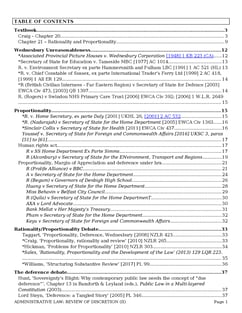Pearlman v Keepers and Governors of Harrow School [1979] QB 56 (CA)
Judgement for the case Pearlman v Keepers and Governors of Harrow School
Table Of Contents
Under the Leasehold Reform Act 1967 tenants who carried out “structural benefits” were entitled to certain benefits.
A county court judge held that Plaintiff’s installation of central heating didn’t constitute a “structural improvement”.
Plaintiff applied to CA on the grounds that the judge was not entitled to make that finding, since he had erred in law, and therefore made a jurisdictional error.
CA granted Plaintiff a quashing order.
Eveleigh LJ
He said that the distinction between jurisdictional and non-jurisdictional errors of law remained, and that this case fell into the former category, because the existence of a structural alteration was collateral to the county court’s jurisdiction.
Since parliament’s statute clearly suggested that central heating would be considered a structural alteration and therefore for a county court judge to decide in a different way from that which parliament had intended was to go beyond his jurisdiction.
Lord Denning MR
The distinction between jurisdictional and non-jurisdictional errors of law is “very fine” and being “rapidly eroded”.
This case is an example of how fine the distinction is: Either one could say that “structural alteration” is a jurisdictional error, in that it is collateral to the judge’s right to decide OR say that the judge must be entitled to interpret the meaning of structural alteration and it is within his jurisdiction to make an inquiry into this matter.
In truth the distinction is used for instrumental purposes by superior courts in deciding whether to interfere with lower courts’ decisions (result based).
He therefore recommends scrapping the distinction and says that higher courts should always correct the lower courts when they err in law.
Lane LJ (dissenting)
He said that Eveleigh J’s interpretation would render all interpretive errors by judges jurisdictional mistakes in law, since a correct interpretation of the statute is collateral to the judge’s jurisdiction.
The conclusion would be that judges are “not entitled” to make wrong decisions. "... the only circumstances in which this court can correct what is to my mind the error of the [county court] judge is if he was acting in excess of his jurisdiction as opposed to merely making, an error of law in his judgment by misinterpreting the meaning of 'structural alteration ... or addition.'"
----
Lord Denning’s view is best. He and Lane LJ highlight the problem with the distinction and Eveleigh’s view only confuses things.
RELATED CASES
For Further Study on Pearlman v Keepers and Governors of Harrow School
Need instant answers? Our AI exam tutor is here to help.
Ask questions 🙋 Get answers 📔 It's simple 👁️👄👁️
Our AI is educated by the highest scoring students across all subjects and schools. Join hundreds of your peers today.
Get StartedSimilar Cases
Related Product Samples
These product samples contain the same concepts we cover in this case.
| Administrative Law | Errors Of Fact Notes (31 pages) |
| Administrative Law | Jurisdiction Notes (26 pages) |
| Administrative Law | Jurisdiction Notes (15 pages) |
| Administrative Law | Jurisdiction Problem Question Notes Notes (9 pages) |

 Since 2010, Oxbridge Notes has been a trusted education marketplace, supplying high-quality materials from top achievers at universities like Oxford, Cambridge, LSE, Harvard, and Yale.
Since 2010, Oxbridge Notes has been a trusted education marketplace, supplying high-quality materials from top achievers at universities like Oxford, Cambridge, LSE, Harvard, and Yale.